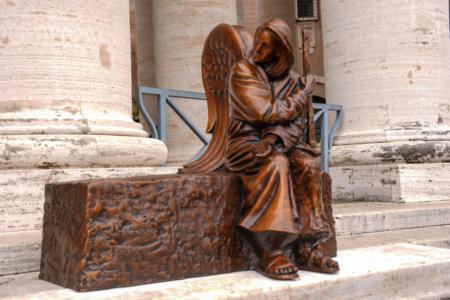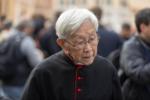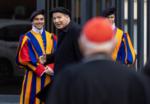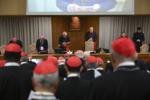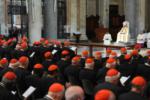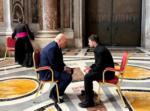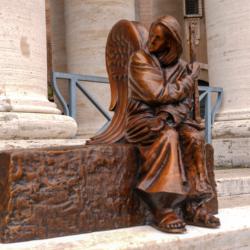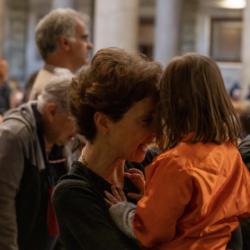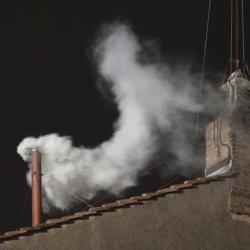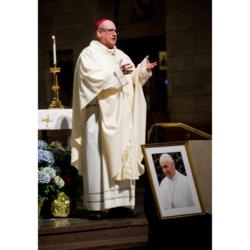Goal of committee is to make reconfiguration ‘fair,’ says Meade
BRIGHTON — The External Review Committee has approved the overall reconfiguration process, while acknowledging that some mistakes were made, said Peter Meade, co-chair of the committee appointed by Archbishop Seán P. O’Malley.
"We think that the diocese got it mostly right and that there were some places where things should have been different," Meade told The Pilot in a Dec. 20 interview.
Meade noted that the process of reconfiguration is very difficult and emotional. Catholics have a relationship with God, but that relationship is nurtured within a parish setting, he said.
"We're all emotional as human beings and part of our faith is emotional as well. God loves us. We love Him," he said. "Closing a parish becomes a very difficult thing to do. I don't think there's any place in the world where you can say, 'Boy, that really went easily.'"
Meade said he hopes the committee will help the process, so that at the end of reconfiguration the archdiocese will be able to say “the process was — given all the circumstances — as fair as it could be made.”
He also said it is important for the committee to help show Catholics that “the archbishop of Boston is listening to them.”
"We believe that Archbishop Seán is a man of great faith and humility, and we trust him," he said.
Meade called the committee meetings with the archbishop “a very respectful discussion on both parts,” and said the archbishop has been very receptive of the committee’s suggestions.
Committee members have also worked well together and have shown respect for each other’s opinions, he added.
Meade said he has found his work with the committee “uplifting” and wants to continue to hear the concerns of parishioners.
While Meade would not comment on specific parish closing decisions that were handled poorly, he acknowledged that the cluster recommendation teams did cause problems in some areas.
Meade noted that the cluster — a group of several parishes with a vicariate — was the best diocesan geographic unit available for local discussions, but said clusters were formed to do “something very different.”
"I think there are some places where vicariate lines didn't makes sense for what the community was like," he said. "It might have worked better if there was another instrument created. It was a very uneven instrument to use."
The archbishop has maintained that changes could be made to the reconfiguration process if he was presented with significant new evidence, and the External Review Committee has brought such evidence to his attention. This has led the archbishop to alter reconfiguration plans for Newton, Roxbury, Stoughton and Charlestown as well as to grant his first outright reversal of a parish closure in Plymouth.
Meade spoke of the committee’s experience with its most recent recommendations to change reconfiguration plans for Plymouth and Newton.
He said parishioners from the Plymouth parish, Blessed Kateri Tekakwitha, wrote the review committee, saying they had new information. They also made it clear in the letter that they had no intention of holding a vigil. Meade and his co-chair Sister Janet Eisner met with parishioners and brought back information about the town’s growing population to the committee, which unanimously recommended that the parish remain open. The archbishop granted the parish a reprieve Dec. 14.
On the same day, Archbishop O’Malley announced changes to the reconfiguration plans for the city of Newton. The archbishop has asked two pairs of parishes to re-evaluate their situations. A new administrator will be appointed to oversee the paired St. Bernard and Corpus Christi Parishes, and another will oversee Mary Immaculate and St. Philip Neri Parishes.
According to Meade, the committee and the archbishop decided that the situation in Newton needed a new look and the best way to do that was to appoint administrators.
Meade added that early on the archbishop wanted the committee to look at St. Bernard Parish, which was scheduled to close but was granted a reprieve in October.
"The first meeting Sister Janet and I had with the archbishop, we asked him if there were any places he thought we should look," said Meade. "St. Bernard's was the first place he mentioned."
Meade added that the entire reconfiguration process is going to take more time than originally anticipated, and the committee’s work is ongoing.
"We are doing ongoing analysis, trying to underpin our discussions with some ability to quantify measurements of parishes in the entire diocese. That's not finished. We believe it will be a very helpful instrument to the archbishop and to pastors as well," he said. "We need some time to have discussions with the archbishop and others in the diocese about that."
